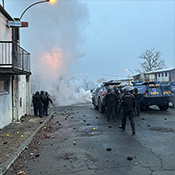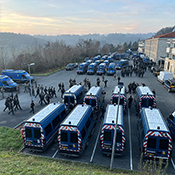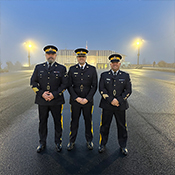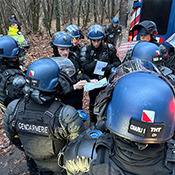RCMP Public Order Unit partners with French national police for training
By Mara Shaw
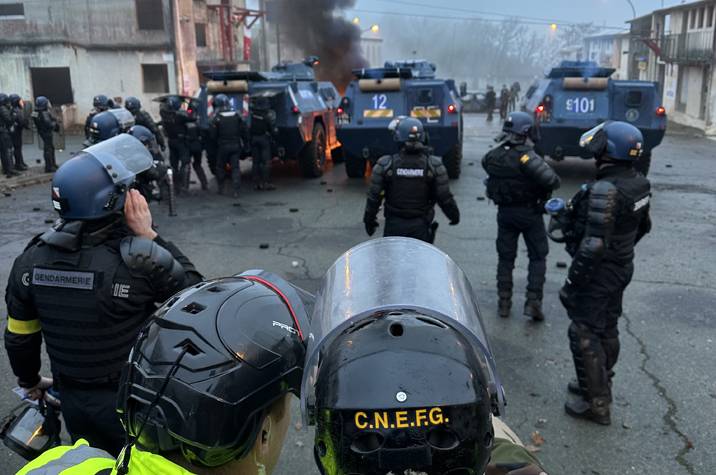
Police officers navigate simulated scenarios at the Gendarmerie Nationale training centre in Dordogne, France.
Image by National Training Centre for Gendarmerie Forces
August 8, 2024
Content
The landscape for protesting across the globe has changed over the years. As social media continues to challenge traditional public spaces, international influences can have greater impact than ever before. With the rise and evolution of protests, public order continues to become a greater priority for police, and to stay ahead, foreign police agencies have to coordinate efforts and exchange strategies.
When the RCMP wanted to bolster its capacities in the maintenance and restoration of public order, it looked to France's Gendarmerie Nationale for training. Recognizing the country's vast experience in the field of public order as a great learning opportunity, three RCMP officers from Ottawa's Tactical Support Group travelled to Saint Astier, in the southwestern countryside of France for an 11-day training event at the French National Police's Public Order Unit training centre in January 2024.
"We realize that the adversary is becoming increasingly mobile and ultra-violent, with very elaborate and even paramilitary modes of action." says Captaine Frédéric Limorté, who helped organize the training and welcomed the RCMP officers. "We know certain phenomena that our partners are not aware of. They are increasingly confronted with these new phenomena, and they offer us different means of action, which are useful."
The tactical group, which falls under the RCMP's National Public Order Unit, wanted to broaden its scope and exposure to tactical measures in response to environmental factors such as globalization or hyper-mediatisation. Understanding how international forces respond to public disorder is just one of the ways this unit aims to refine and standardize its operational readiness strategies.
"Our mandate here in Ottawa is to provide public order support for protective operations," says Sergeant Richard Bernard, Critical Incident Coordinator and member of the group. "The need for standardization and interoperability within our teams is consequence of the fact that we are the national police force. When we get deployed to other parts of Canada, it's important for us to be able to come and seamlessly work with our partner divisions."
Learning from experts
"There was a profound national crisis in France in 1968," says Limorté. "We saw a lot of demonstrations, with sensitivity and gravity that were completely unheard of in France. The Force quickly decided to create this centre because it realized that maintaining/restoring order was not just a doctrine but a social peace arbitrator without which public liberties would no longer be guaranteed. As a result, the training and development of mobile force units in this area became essential."
Over nearly two weeks, the Canadian officers took part in classroom instruction covering intelligence methods, and participated in simulated tactical operations for a first-hand experience in facing potential public order crises.
"The Gendarmerie Nationale have a very robust training curriculum, and, what I would characterize as, second-to-none training facilities," says Bernard. There the officers were able to delve into the French police's intentionally meticulous strategies around tactics, communication, and the command structure used during public disorder.
Way forward
The group returned to Canada with several concepts and best practices to raise to the National Tactical Troop Advisory Committee, which meets to discuss developments in public order, operations, and training. "I shared our experiences in France and our plan is to test these practices and provide feedback to the divisions through the National Policy Centre here in Ottawa."
As the Canadian public continues to exercise their rights to engage in protests, Bernard stresses that now more than ever, operational readiness should underpin the strategies around public order. These knowledge-transfer opportunities help to expand and modernize the force's approach and capacity in protective operations.
Bernard says he hopes the group is able to send more RCMP command-level officers to France to participate in the training. "Protest movements have an international scope. What happens in one country eventually, lands here in Canada," he says. "As law enforcement, have to be ready and able to scan the international environment to see what's on the horizon in the ever-evolving protest landscape."
